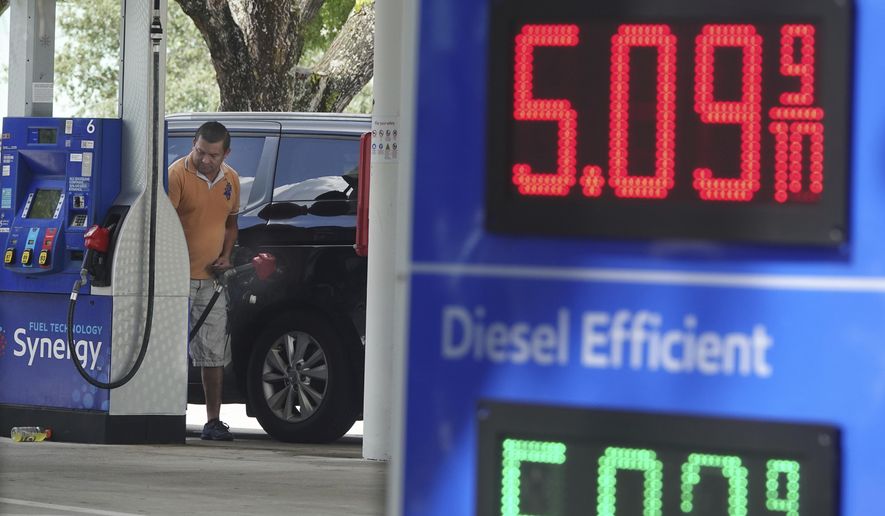Clinton administration Treasury Secretary Lawrence H. Summers said Sunday that inflation and gas prices could climb higher because of the war in Ukraine, leading to even higher prices for consumers.
Mr. Summers, a top economic adviser to Presidents Clinton and Obama, said the Federal Reserve’s economic forecasts have been “too optimistic.” He disagrees with Treasury Secretary Janet Yellen’s assertion that there is “nothing to suggest a recession is in the works.”
“I think the optimists were wrong a year ago in saying we have no inflation, and I think they are wrong now if anyone is highly confident that we are going to avoid recession,” he said on CNN’s “State of the Union.”
Mr. Summers said the combination of high inflation and low unemployment is “always followed within two years by recession.”
“I think there is certainly a risk of recession in the next year, and I think given where we have gotten to, it is more likely than not that we will have a recession in the next two years,” he said.
Mohamed El-Erian, chief economic adviser at Allianz, a multinational financial services company, said he fears inflation “is still going to get worse.”
“We may well get to 9% at this rate,” Mr. El-Erian said on CBS’ “Face the Nation.”
He said a slow response from the Federal Reserve has put the country in an “awful situation.”
“Do you slam on the brakes hard to control inflation and risk of recession?” he said. “Or do you just tap on the brakes and risk inflation lasting much longer than it should?”
The news about gas prices and inflation is getting grimmer for Mr. Biden and congressional Democrats, who are under increasing pressure as the midterm elections approach. Republicans are fighting for voters to flip control of the House and Senate.
“Inflation, gas prices, the border, crime — those are all front and center for the average American right now,” Rep. Don Bacon, Nebraska Republican, said on NBC’s “Meet the Press.”
Consumer prices overall have reached 40-year highs.
The Consumer Price Index rose 8.6% year over year in May, according to Labor Department figures released Friday.
The price surge shows no signs of slowing. Consumer prices rose 1% on a month-to-month basis in May, up from a 0.3% increase in April.
Grocery prices increased 1.4% last month and nearly 12% in the past year.
It was a tough pill to swallow for the White House and economists, who hoped the numbers would cool off.
Meanwhile, the national average retail price for a gallon of gasoline reached $5 for the first time on Saturday, according to AAA figures.
The average price per gallon marks a $1.93 rise over the past year. It was up 19 cents from just a week earlier.
Drivers in some parts of the country are paying far more for gasoline. The average cost per gallon for Californians is $6.43, according to AAA.
The skyrocketing prices coincide with higher demand as Americans hit the road over the summer. They also have fueled more partisan warfare in Washington.
“Biden promised to eliminate oil and natural gas. Now families are paying the price for his anti-American energy agenda. Biden’s solution? Force Americans to drive less or buy an expensive electric vehicle,” Republican National Committee Chairwoman Ronna McDaniel said in a statement Saturday. “Biden is out of touch and has no real solutions, no plan, and no sympathy for struggling families.”
Mr. Biden has blamed skyrocketing global energy prices on Russia’s invasion of Ukraine.
Asked Sunday what Mr. Biden can do about gas prices, Mr. Summers said “not a lot.”
“The gas price piece of this is driven by the geopolitical developments around Ukraine,” he said. “It is hypocrisy in the extreme when people say we need to stand strongly with Ukraine and then blame the administration for the fact gas prices are higher than they were a year ago.”
Mr. Summers said Mr. Biden and lawmakers on Capitol Hill could help ease inflation.
He said it was important that Mr. Biden met with Federal Reserve Chair Jerome Powell at the White House in late May and voiced his respect for the Federal Reserve Board.
Mr. Summers suggested lifting or reducing tariffs on goods from China to cut consumer prices. He said lawmakers should raise taxes on corporations and lower prescription drug costs.
“All of that would operate to reduce inflation,” he said. “So there are things we can do.”
• Ramsey Touchberry contributed to this report.
• Joseph Clark can be reached at jclark@washingtontimes.com.
• Seth McLaughlin can be reached at smclaughlin@washingtontimes.com.




Please read our comment policy before commenting.